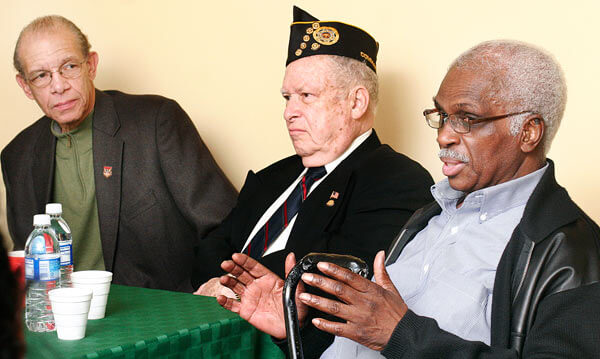By Joe Anuta
The historic Lewis H. Latimer House in Flushing celebrated a belated Veterans Day Sunday by having former servicemen from the borough tell stories from their time in the U.S. Army and U.S. Navy during the 1950s, and about the racial discrimination that came along with it.
“I think people love heroes and war stories that talk about fantastic things,” said Alfred Rankins, who chairs the board of directors for the house. “But I wanted to bring in the common person who served, came back, but can just slip away.”
Rankins was inspired to host the four Queens veterans by Latimer, an early 1900s polymath who fought in the Civil War. The house is a museum dedicated to the life of Latimer and the nearby housing projects bear his name.
“Latimer was in the Union Army,” Rankins said. “We wanted to celebrate Veterans Day based on his legacy.”
Latimer, the self-taught engineer, joined the Union Army at the age of 16, just a year younger than Alvin Mackey, a Flushing native who spoke at the event, joined the U.S. Navy in the 1950s.
Mackey recalled about how he lied about his age to get into the Navy and turned 18 in uniform. In the Navy, he looked back at boot camp fondly and remembered the many ports he visited all over the world during the Korean War.
Arthur O’Meally was stationed in Mainz, Germany, during the Cold War, a period during the latter half of the 20th century when America was on the brink of armed conflict with the Soviet Union, and described his time in the Army as one fraught with tension.
“We were always waiting in our little town of Mainz,” he said. “The sirens would go off, often at 1 in the morning, and we would have to go get our gear and go somewhere, spending a few days in the woods.”
While they discussed their experiences broadly, the vets had many smaller memories they called up with a smile.
Benjamin Singer, a Jewish war veteran, went to his high school reunion some years after he left the Army and saw a stranger pointing a finger at him from across the gym.
“I know you,” the man said. “You gave me KP.”
The man was referring to kitchen patrol, a 24-hour disciplinary measure metered out by Singer during the Korean War. The man’s company left for Korea while he was still serving his punishment and he wound up in Japan instead. Judging by the number of casualties in his company, he credited Singer with saving his life.
But not all the memories were idyllic.
Mackey, a black seaman, recalled the racism he endured from the American citizens he was fighting to protect.
“When I was in the Navy, the worst time I had was when I got back to the States. When you got back to Norfolk, Va., all hell broke loose,” he said, referring to bubbling racial tensions that often broke out into heated arguments or fights. “But you can go to France and Japan, these are people we fought against, and they treat you so good.”
Others mentioned that black soldiers were not allowed to stay in the same barracks as white soldiers, and that black and white soldiers could not go out drinking together.
But Mackey said that within the Navy there was a camaraderie that reminded him of the Flushing street where he grew up, playing with children of all races and colors.
“They didn’t see color,” he said. “They saw the uniform.”
The feisty 78-year-old said he did not regret his service and would do it again in a heartbeat.
“If you give me a gun, I’d go back in a day and fight for my country,” he said.
Reach reporter Joe Anuta by e-mail at januta@cnglocal.com or by phone at 718-260-4566.



































